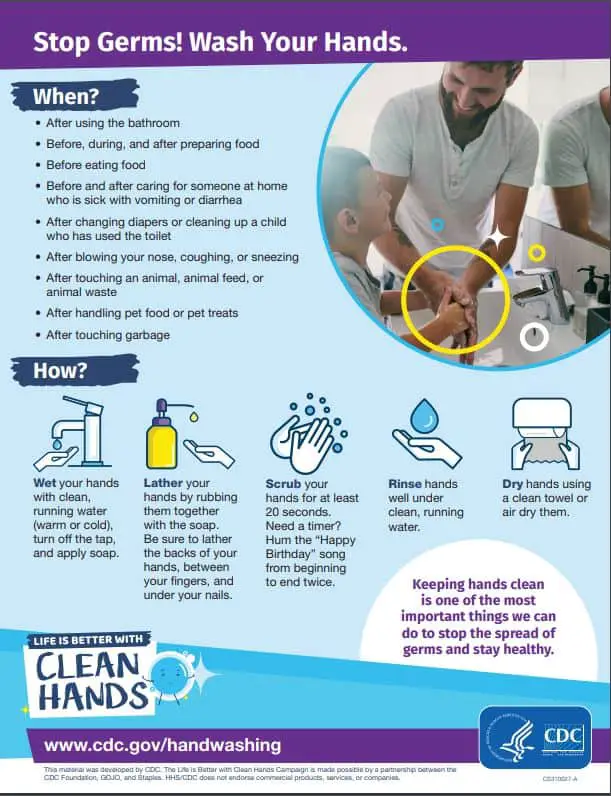How to wash your hands correctly
The act of washing hands is quite simple. According to the CDC, there are five important steps to washing hands correctly:
- Wet your hands with water, preferably warm water as warm water is more efficient when it comes to killing germs.
- Use soap or handwashing detergent to lather up while washing hands.
- Keep scrubbing your hand with soap for at least 20 seconds.
- Properly rinse your hands once your 20 seconds are over.
- Finally, dry them with a clean towel or through air drying.
These steps are quite simple but people find them quite hard to follow. In 2018, a study was carried out by the US Department of Agriculture (USDA) where 383 volunteers were brought in to test kitchens for prepping some burgers and salads.
They were provided with step-by-step instructions and their actions were monitored. Although the study was not on hand washing, the researchers later discovered that 97% of the volunteers did not heed the handwashing instructions provided by the CDC.
Around 79.5% of people didn’t scrub their hands for 20 seconds before moving on to the next step. Some didn’t even wet their hands before lathering up while others didn’t dry their hands properly before proceeding to touch the food items. This is quite disturbing to know.
Another concern that people have is why not use hand sanitizers instead of constantly washing hands? Agreed that hand sanitizers are quite effective when it comes to destroying germs and are even used by doctors and nurses, the same may not be acceptable when it comes to food environments. Let’s take a few examples to understand this better.
When you wash hands, you are keeping germs at bay, and this is a very important thing when cooking. According to the CDC, Centers for Disease Control and Prevention, washing hands is the most important step you can take to contain germs and stop the spread of infection. How hard that can be right? All you need to do is remember to clean your hands after coming home from the outside and you can help the spread of serious infections.
Even though this sounds simple, we as humans have a long way to go when it comes to handwashing. People are lazy. People are not aware of hygiene regulations. And because of these factors, it is hard for people to understand the importance of handwashing. Spending a few more minutes at the sink with soap and water seems insignificant to many people. And there is historical proof for the same.
History Lesson In Washing hands
In the 1800s, the cases of puerperal fever were quite high. Puerperal fever was a bacterial infection that new mothers face after childbirth. Ignaz Semmelweis, a doctor and a scientist was the first person to discover that the mere act of washing hands clean before delivery has the potential to decrease the cases of puerperal fever by 90%!
Semmelweis compiled his research and found that by just washing his hands, he was able to reduce the mortality rate due to puerperal fever to 1%. This was huge. But when Semmelweis presented his findings in front of the other doctors and surgeons, they laughed at him.
He was mocked at by his fellow colleagues who thought that maybe Semmelweis had lost his mind! The mockery was so extreme that Semmelweis had a nervous breakdown and had to be admitted to an asylum.
So yes, even though washing hands may sound quite simple and obvious, people still need to be convinced of it. And Semmelweis was not alone. Louis Pasteur also had a hard time explaining to his fellow doctors that they need to wash hands between patients. This simple act could save more lives than they might realize.
But now it’s high time that we realize the importance of washing hands. In the 19th-century, people used to keep boiling hot water for washing hands as hot water has the potential to kill germs and contain infections.
Washing hands in the kitchen
Today, we have the same running hot water through the taps in our homes. It should not be hard to follow the simplest of hygiene requirements, should it now? And why not bring this wonderful habit to the kitchen as well?
Properly washing hands is one of the most important things that people should indulge in when they are in the kitchen. Whether you are cooking for yourself or for your loved ones, washing hands can be the first step and a precaution to prevent food poisoning. Using soaps or a detergent product can help contain germs and prevent their spread around the kitchen.
When to Wash Hands in the Kitchen
Now since we know that washing hands is the first step to contain contamination, the next question that comes up is when to wash hands? Or what instances in the kitchen mandate washing hands?
The guidelines are pretty simple and straightforward when it comes to washing hands in the kitchen or in places dealing with cooked food. It is mandatory to wash hands after you touch anything that might be prone to germs or are likely to be germ-breeding places. The most important point to remember is to always wash hands before touching any food.
The next point to remember is to wash hands after touching raw foods, especially meats. Raw poultry meat is a common source of various bacteria such as Salmonella, Campylobacter, Clostridium perfringens, and many others.
If you do not wash hands properly after coming in contact with raw meats, you might possess the risk of transferring these bacteria to other food items. For example, let’s say you touch some fresh parsley leaves that go as garnishings on dishes after touching raw meat.
Now since the parsley leaves will not be cooked as it only gets served as garnishings, the bacteria will keep prevailing. This might ultimately lead to serious food poisoning!
Another important guideline is to keep in mind to wash hands after handling the trash. The trash is the best environment for germs to multiply and wreak havoc. So it is very important to wash hands with soap after handling trash. Other than that, if you are sick or in contact with someone that’s sick, you need to maintain hygiene in the kitchen.
Help Ensure fellow Chefs wash Their Hands
Now how would someone ensure that people in the kitchen are actually following hygiene rules and washing their hands prior to handling food?
For example, it would be difficult for a restaurant owner or manager to ensure that the employees are washing their hands properly. Fret not, we have a few tips that might help you.
The first thing you can do is keep an eye on the washbasin where the employees normally wash their hands. Such a basin should be easily accessible to them. If you see something blocking the easy access to the basin, then you can be assured that not many of your employees are willingly washing their hands!
Moreover, if the sink meant for washing hands is filled with other items, then there’s a high possibility that maybe it’s not being used for its services. Also, the sink should not be filled with standing water as that is a serious hygiene violation and a health hazard.
Moreover, if your employees are washing their hands whenever required, then you would run out of paper towels and soap frequently. But if you are not sure when you last replaced or restocked them, you might have a problem right there. This means that your employees are not washing hands as much as required.
Why can’t I just use a Hand Sanitizer
You are marinating some chicken breasts with an amalgamation of spices. Since you will be using your hands, whatever is on your hands will get to the chicken and whatever’s in the chicken will get stuck to your hand.
Now let’s say you use a hand sanitizer. Every hand sanitizer uses some residue that remains in your hand after you use it. Now this residue will get to the chicken when you are marinating.
Sanitizer residues might contain rubbing alcohol, perfumes, or other ingredients that were not meant to be a part of the chicken. This might make people sick. Also, fats and oils from the chicken will stick to your hand as well.
This would create a very nice nourishing environment for germs to multiply on your hand! And no amount of sanitizer would be able to get rid of that! Only washing your hands correctly using the CDC guidelines would help to get rid of the germs 100%.
Washing hands correctly is also important even when wearing gloves. It’s always best to wash hands before wearing gloves and after taking them off. This way you can prevent germs off your hands getting on the gloves and vice-versa.
Now that we all are well-versed with the correct handwashing procedures, let’s make it a daily habit to incorporate those rules into our day-to-day lives. Let’s wash hands responsibly and prevent the spread of germs and diseases!
If you are cooking when out hiking then hand sanitizer is still better then no hand washing. And if you wanna make your own hand sanitizer then I have an article on it here.


